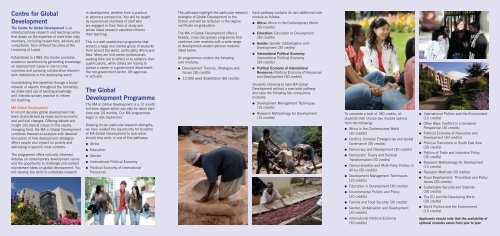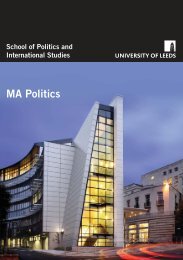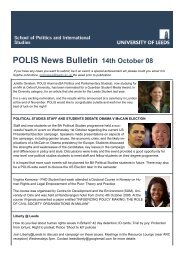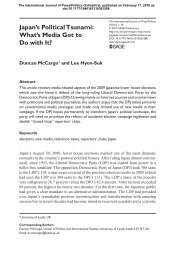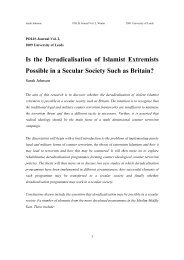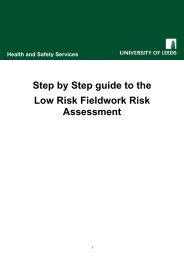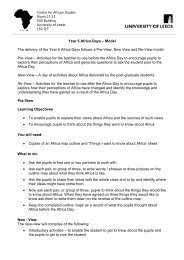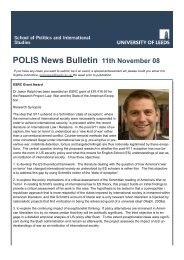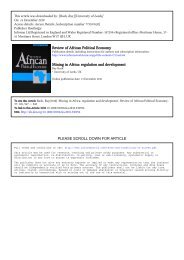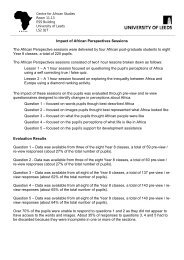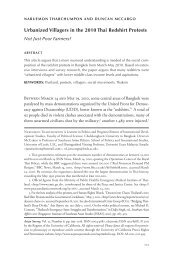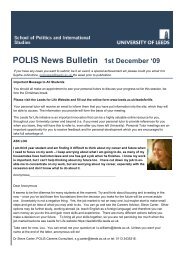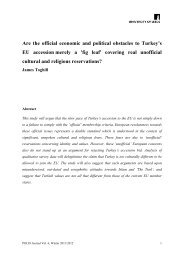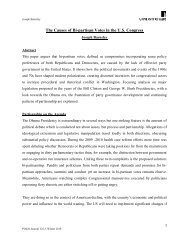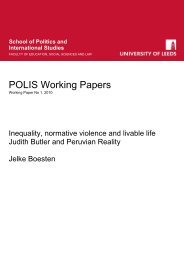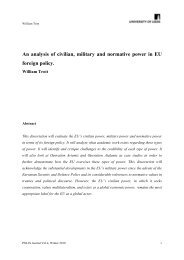MA Global Development - School of Politics International Studies ...
MA Global Development - School of Politics International Studies ...
MA Global Development - School of Politics International Studies ...
Create successful ePaper yourself
Turn your PDF publications into a flip-book with our unique Google optimized e-Paper software.
Centre for <strong>Global</strong><strong>Development</strong>The Centre for <strong>Global</strong> <strong>Development</strong> is aninterdisciplinary research and teaching centrethat draws on the expertise <strong>of</strong> more than sixtymembers, including researchers, advisors andconsultants, from different faculties at theUniversity <strong>of</strong> Leeds.Established in 1984, the Centre promotesacademic excellence by generating knowledgeon development issues in low incomecountries and pursuing collaborative researchwith institutions in the developing world.Consolidating this expertise through a broadnetwork <strong>of</strong> experts throughout the University,we make best use <strong>of</strong> existing knowledgeand interdisciplinary practice to informour teaching.<strong>MA</strong> <strong>Global</strong> <strong>Development</strong>In recent decades global development hasbeen characterised by major socio-economicand political changes. Offering debate andinsight into topical issues in this rapidlychanging field, the <strong>MA</strong> in <strong>Global</strong> <strong>Development</strong>combines theoretical analyses with detaileddiscussion <strong>of</strong> how development strategiesaffect people and impact on poverty andwell-being in specific local contexts.The programme <strong>of</strong>fers critically informeddebates on contemporary development issuesand the opportunity to challenge and contestmainstream ideas on global development. Youwill develop the skills to undertake researchin development, whether from a practiceor advocacy perspective. You will be taughtby experienced members <strong>of</strong> staff whoare engaged in their field <strong>of</strong> study andwhose latest research expertise informstheir teaching.This is a well-established programme thatattracts a large and diverse group <strong>of</strong> studentsfrom around the world, particularly Africa andAsia. Many are mid-career pr<strong>of</strong>essionalsseeking time out to reflect or to enhance theirqualifications, while others are hoping topursue a career in a government department,the non-government sector, UN agenciesor activism.The <strong>Global</strong><strong>Development</strong> ProgrammeThe <strong>MA</strong> in <strong>Global</strong> <strong>Development</strong> is a 12 monthfull-time degree which can also be taken parttimeover 24 months. Our <strong>MA</strong> programmesbegin in late SeptemberDrawing on our particular research strengths,we have created the opportunity for students<strong>of</strong> <strong>MA</strong> <strong>Global</strong> <strong>Development</strong> to specialise,should they wish, in one <strong>of</strong> five pathways:● Africa● Education● Gender● <strong>International</strong> Political Economy● Political Economy <strong>of</strong> <strong>International</strong>ResourcesThe pathways highlight the particular researchstrengths <strong>of</strong> <strong>Global</strong> <strong>Development</strong> in the<strong>School</strong> and will be reflected in the degreecertificate on graduation.The <strong>MA</strong> in <strong>Global</strong> <strong>Development</strong> <strong>of</strong>fers aflexible, cross-disciplinary programme thatcombines core modules with a wide range<strong>of</strong> development-related optional moduleslisted below.All programmes contain the followingcore modules:● <strong>Development</strong> Theories, Strategies andIssues (30 credits)● 12,000 word dissertation (60 credits)Each pathway contains its own additional coremodule as follows:● Africa: Africa in the Contemporary World(30 credits)● Education: Education in <strong>Development</strong>(30 credits)● Gender: Gender, <strong>Global</strong>isation and<strong>Development</strong> (30 credits)● <strong>International</strong> Political Economy:<strong>International</strong> Political Economy(30 credits)● Political Economy <strong>of</strong> <strong>International</strong>Resources: Political Economy <strong>of</strong> Resourcesand <strong>Development</strong> (30 credits)Students choosing to take <strong>MA</strong> <strong>Global</strong><strong>Development</strong> without a specialist pathwayalso take the following two compulsorymodules:● <strong>Development</strong> Management Techniques(15 credits)● Research Methodology for <strong>Development</strong>(15 credits)To complete a total <strong>of</strong> 180 credits, allstudents then choose two module optionsfrom the following:● Africa in the Contemporary World(30 credits)● Conflict, Complex Emergencies and <strong>Global</strong>Governance (30 credits)● Democracy and <strong>Development</strong> (30 credits)● Democratic Theory and PoliticalTransformation (30 credits)● Democratisation and Multi-Party <strong>Politics</strong> inAfrica (30 credits)● <strong>Development</strong> Management Techniques(15 credits)● Education in <strong>Development</strong> (30 credits)● Environmental <strong>Politics</strong> and Policy(30 credits)● Famine and Food Security (30 credits)● Gender, <strong>Global</strong>isation and <strong>Development</strong>(30 credits)●●●●●●●●●●●<strong>International</strong> <strong>Politics</strong> and the Environment(15 credits)Other Wars: Conflict in a GenderedPerspective (30 credits)Political Economy <strong>of</strong> Resources and<strong>Development</strong> (30 credits)Political Transitions in South East Asia(30 credits)<strong>Politics</strong> <strong>of</strong> Trade and Industrial Policy(30 credits)Research Methodology for <strong>Development</strong>(15 credits)Research Methods (30 credits)Rural <strong>Development</strong>: Theoretical and PolicyIssues (30 credits)Sustainable Security and Stability(30 credits)The EU and the Developing World(30 credits)World <strong>Politics</strong> and the Environment(15 credits)●<strong>International</strong> Political Economy(30 credits)Applicants should note that the availability <strong>of</strong>optional modules varies from year to year.


